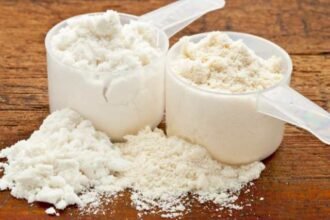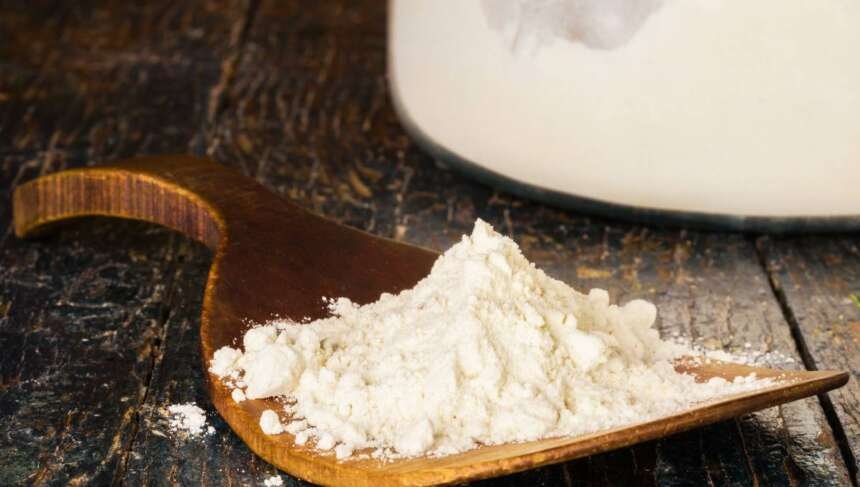All-purpose flour is a pantry staple found in most households worldwide. This versatile ingredient forms the foundation of countless baked goods, from fluffy bread loaves to delectable pastries.
However, beyond its culinary applications, all-purpose flour harbors a wealth of nutritional benefits that often go unnoticed.
In this comprehensive article, we delve into the surprising health advantages and vital facts surrounding this ubiquitous flour, shedding light on its role in promoting overall well-being.
Nutrient Profile
All-purpose flour, derived from wheat, is a complex carbohydrate that provides essential nutrients to support various bodily functions. Each 100-gram serving contains:
| Nutrient | Amount per 100g |
|---|---|
| Calories | 364 kcal |
| Total Fat | 1.2 g |
| – Saturated Fat | 0.2 g |
| – Trans Fat | 0 g |
| Cholesterol | 0 mg |
| Sodium | 2 mg |
| Total Carbohydrates | 76.3 g |
| – Dietary Fiber | 2.7 g |
| – Sugars | 0.4 g |
| Protein | 10.3 g |
| Vitamin D | 0 IU |
| Calcium | 15 mg |
| Iron | 4.6 mg |
| Potassium | 109 mg |
While carbohydrates are the primary component, all-purpose flour also offers a respectable amount of protein and dietary fiber, both essential for maintaining a balanced diet.
Health Benefits
1. Enhance Cardiovascular Well-being
All-purpose flour contains various minerals and vitamins that play a crucial role in cardiovascular health. The iron content, for instance, is vital for the formation of red blood cells and the transportation of oxygen throughout the body. [Source]
Adequate iron levels support efficient oxygen delivery to the heart and other vital organs, reducing the risk of anemia and associated cardiovascular complications.
Furthermore, the folate present in all-purpose flour aids in the breakdown of homocysteine, an amino acid linked to an increased risk of heart disease. By regulating homocysteine levels, folate helps maintain a healthy cardiovascular system. [Source]
2. Promote Energy and Muscle Function
The carbohydrate content in all-purpose flour serves as a valuable source of energy for the body. These complex carbohydrates are broken down into glucose, which is subsequently utilized by cells for energy production.
This energy supports various bodily functions, including physical activity and cognitive processes. Moreover, all-purpose flour contains a moderate amount of protein, which is essential for building and repairing muscle tissue. [Source]
The combination of carbohydrates and protein makes all-purpose flour an ideal choice for athletes and individuals engaging in regular physical exercise, as it provides both energy and the necessary building blocks for muscle recovery and growth.
3. Fortification and Enrichment
In many countries, all-purpose flour is fortified or enriched with additional vitamins and minerals to enhance its nutritional value [Source]. Common fortifications include:
- Iron: Helps prevent iron deficiency anemia, a common issue worldwide.
- Folic acid: Supports healthy fetal development and reduces the risk of neural tube defects in pregnant women.
- Vitamin B1 (thiamine): Essential for energy metabolism and nervous system function.
- Vitamin B3 (niacin): Supports digestive health and maintains healthy skin, hair, and nails.
These fortifications ensure that consuming all-purpose flour provides a broader range of essential nutrients, promoting overall health and well-being.
Nutrition Tips
Balance with Whole Grains While all-purpose flour can be a convenient ingredient, it’s important to balance its consumption with nutrient-dense whole grains. Whole grains provide a wealth of essential vitamins, minerals, and fiber that are often lacking in refined flours like all-purpose flour.
4. Gluten Considerations
It’s important to note that all-purpose flour contains gluten, a protein found in wheat, barley, and rye. While gluten poses no harm to most individuals, those with celiac disease or gluten sensitivity should avoid consuming all-purpose flour and opt for gluten-free alternatives like rice flour, almond flour, or coconut flour.
Potential Downside
- Gluten Content: All-purpose flour contains gluten, a protein found in wheat, barley, and rye. If you have celiac disease or non-celiac gluten sensitivity, consuming gluten can lead to adverse reactions, including digestive issues, inflammation, and nutrient malabsorption. [Source]
- Refined Grain: All-purpose flour is a refined grain product, meaning it has undergone processing that removes the nutrient-rich bran and germ portions of the wheat kernel. This refining process strips away a significant portion of the fiber, vitamins, and minerals naturally present in whole grains. [Source]
- Low Fiber Content: Although all-purpose flour contains some fiber, its fiber content is relatively low compared to whole-grain alternatives. Adequate fiber intake is essential for maintaining a healthy digestive system, regulating blood sugar levels, and promoting feelings of fullness.
- Potential for Nutrient Deficiencies: While all-purpose flour is often fortified with essential nutrients like iron and B vitamins, relying solely on fortified flour as a primary source of these nutrients may not be sufficient to meet daily requirements, especially for individuals with increased nutrient needs, such as pregnant women or those with certain medical conditions.
- Glycemic Impact: All-purpose flour is a refined carbohydrate that can contribute to rapid spikes in blood sugar levels, particularly when consumed in large quantities or combined with other high-glycemic foods. This can be problematic for individuals with diabetes or those at risk of developing metabolic disorders. [Source]
- Potential for Weight Gain: As a concentrated source of calories from carbohydrates, overconsumption of all-purpose flour and products made with it can lead to excess calorie intake, which may contribute to weight gain if not balanced with an overall healthy diet and regular physical activity. [Source]
- Potential for Allergies: While not as common as allergies to other grains like wheat or gluten, some individuals may experience allergic reactions to specific proteins or compounds present in all-purpose flour.
Conclusion
All-purpose flour, often overlooked for its nutritional value, emerges as a surprisingly beneficial ingredient for overall health.
From supporting digestive well-being and cardiovascular function to providing energy and aiding muscle recovery, this versatile flour offers a wealth of advantages.
By incorporating all-purpose flour into a balanced diet and taking advantage of its fortified and enriched versions, you can unlock a range of essential nutrients that contribute to a healthier lifestyle.
However, moderation and a diverse dietary approach remain key to reaping the maximum benefits of this pantry staple.








